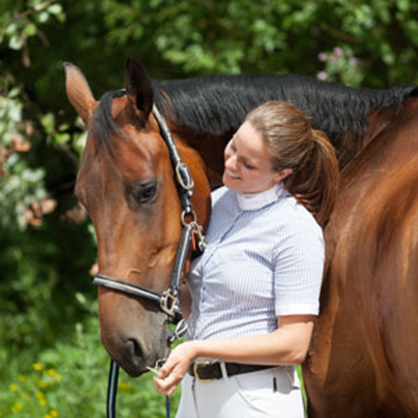An Online Eye-Opener
 By: Equine Guelph, Jackie Bellamy-Zions
By: Equine Guelph, Jackie Bellamy-Zions
After spending only five minutes browsing my email inbox, I am reminded of the need to promote Equine Guelph’s Behaviour and Safety eWorkshop to anyone and everyone who ever plans to spend time in the company of equines.
A horse has died while being hand-grazed. It’s neck broken after stepping into a lead shank chain which was not being used over the nose but doubled through the halter instead. A Facebook video shows a toddler frolicking in a paddock with a loose pony. The caption is cute, but watching the clip fills me with dread. I see the pony going back and forth between inquisitive behaviour to defensive body language warning of an impending kick. An accident is waiting to happen if the parents continue to believe this pony is a harmless toy for their tot to play tag with. Photos of people with horses roll in – halter too low on the nose, handler in a precarious position if the horse spooks, the list goes on.
An education in how horses react to what they perceive as frightening doesn’t need to come from the school of hard knocks. As a horse-crazy child born of “non-horsey” lineage, I can tell my fair share of stories about learning the hard way. I wish this popular two-week online course had been around when I was driving my parents insane with demands for riding lessons. Now, as a coach, my lessons revolve around safety, starting with ground handling.
The Behaviour and Safety eWorkshop teaches horse owners to read their horses body language and understand their motivations as a prey species. “We are pleased that horse people are interested in educating themselves about ‘why’ horses behave the way they do and how that translates into becoming better and safer handlers,” says Equine Guelph Director, Gayle Ecker.
Students of the program are 16 years of age and up and they are welcomed by a community where shared experiences further learning. Led by experts, this course has received high praise from parents, new horse owners and coaches who then pass the knowledge on to their students. This eWorkshop qualifies for Equine Canada coaches updating credits and is approved by the Ontario Association of Veterinary Technicians. Guest speaker, Dr. Rebecca Gimenez, brings a wealth of experience, teaching horse handling skills all over the world in her Technical Large Animal Emergency Rescue courses. She communicates from first-hand knowledge that horses can exhibit extremist behaviors; where fear and panic drive them to do things that most owners and handlers cannot imagine in daily life.
“Ignorance is no longer ‘bliss’ when it comes to one’s ownership and relationship with their equine partner, says Gayda Erret, previous student. “One gains vast knowledge they may never have realized they needed.” It is so easy to become complacent in many of the ten topics covered such as: fire safety, trailer loading and safety around the barn and paddocks. This course is a great refresher for industry experts and an excellent start for those new to the world of equines.
Don’t miss out on Equine Guelph’s Horse Behaviour and Safety eWorkshop February 22 to March 6, 2016, for $75 plus HST. Space is limited.
For more details contact Susan Raymond at slraymon@uoguelph.ca or visit: http://www.equineguelph.ca/eworkshops/behaviour_safety.php










